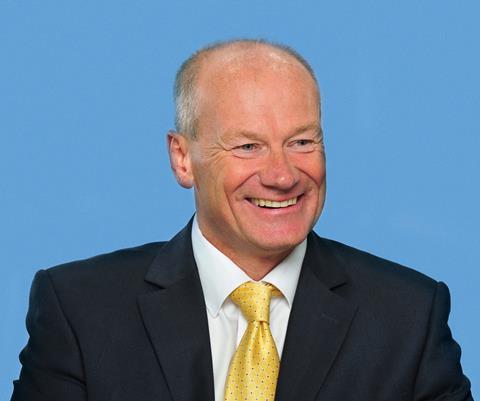Shares in listed firm soar as boss Greg Fitzgerald lays out plan to merge housebuilding business into partnerships arm
Vistry is to focus its entire business on partnerships housing following a review of the group’s strategy in the wake of its £1.1bn merger with Countryside late last year.
The listed housebuilding giant is to merge its 8,700-home traditional housebuilding business in with the newly bolstered partnership housing business, until now known as Countryside Partnerships, under plan to take advantage of the dire need for affordable mixed tenure housing in the UK.
Shares in the firm surged as much as 16% as it announced the plan, which was accompanied by a commitment to return £1bn to shareholders in the next three years, alongside its half year results.

Under the plan, Vistry said it will bring its housebuilding and partnerships operations together “with a simplified operating structure under a single business”, re-purposing land held by housebuilding for partnerships housing.
It said this will entail pre-selling at least 50% of the homes on a site to partners – typically housing associations, build-to-rent investors, local authorities or later living providers – with the firm targeting an average of 65% of plots on each site pre-sold.
Vistry said the re-organisation would drive a further £25m in cost savings, over and above the £60m in efficiencies it said had already been derived from the Countryside purchase, and would result in the number of business units reducing from 32 to 27.
Partnerships housing is the name given to a development model under which developers work with housing associations, local authorities, and investors in private rented housing to bring forward developments which tend to have a much lower proportion of homes for private sale than would be expected from traditional developers.
Vistry chief executive Greg Fitzgerald said: “The scale of the social need for affordable mixed tenure housing across the country continues to increase and it is clear that Vistry is uniquely positioned as the leader in partnerships housing.
“In this context and following our annual review of the Group’s strategy, the Board has concluded that focusing the Group’s operations fully on partnerships by merging our Housebuilding operations with our Partnerships business, best enables sustained growth in housing output, [and] provides greater benefits to our partners, while maximising value”.
>>See also: Vistry says buyer confidence returning
>>See also: Top 150 Housebuilders
He said the Group was targeting 40% Return on Capital Employed in the restructured business and the distribution of £1bn to shareholder over the next three years. The business is also targeting average annual revenue growth of 5-8% and an operating margin of at least 12%.
Vistry reported profit before tax of £114m for the half year to June 30, in line with expectations, up 2.6%. This came on revenue of £1.58bn, up 33%, consequent of the Countryside takeover, however, last year’s net cash position of £115m has been reduced to net debt of £32m in the interim report.
However, the results also showed the deterioration in the performance of the firm’s housebuilding business given the drop in buyer demand since the mini budget and inflation fears forced up interest rates. Vistry said first half revenues in the housebuilding business were down 28% on a “pro forma” basis – assuming the Countryside merger had been in place last year – to £824m after completions dropped by 22% and it increased the use of incentives and bulk sales.
It said that sales had further weakened since June, in part due to the traditional quiet summer season, but also due to “further increases in mortgage costs”.
The strategy change around will see the firm’s housebuilding chief executive, Keith Carnegie, leave the business at the end of 2023, and will result in “a further reduction to the Group’s overall headcount as a result of the expected reduction in the total number of its regional business units”, over and above the 4% reduction made at the time of the Countryside merger.
However, Vistry said it had not yet conducted a detailed headcount review, and will look “to reallocate staff from discontinued roles arising from the change in strategy to other appropriate new roles or growth-related new opportunities”.
Stephen Teagle, chief executive of Vistry Partnerships, told Housing Today the move was a permanent shift backed by the Vistry board designed to help tackle the housing crisis. He said: “I just can’t underestimate what a transformational opportunity and what a transformational move this is.
“We are building our plans to build more homes than anyone else in the country working with our partners. And that is going to be entirely a partnership model, not a traditional house building model. And that’s a hugely significant statement to the market.”











No comments yet